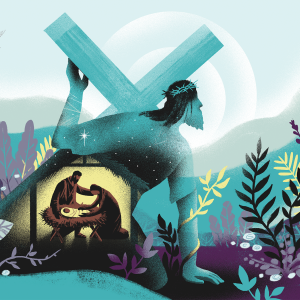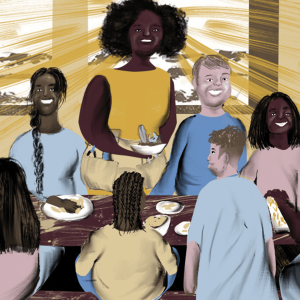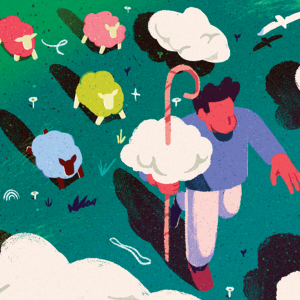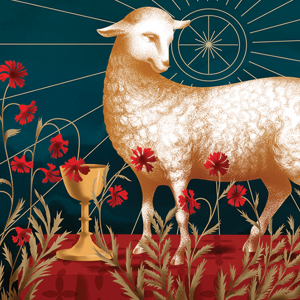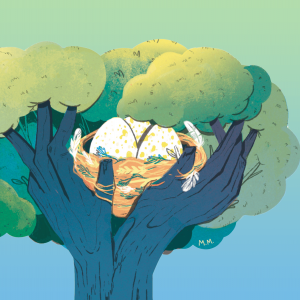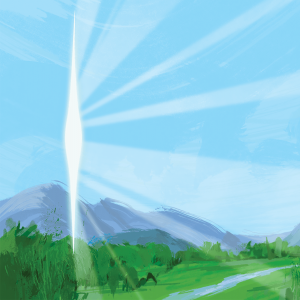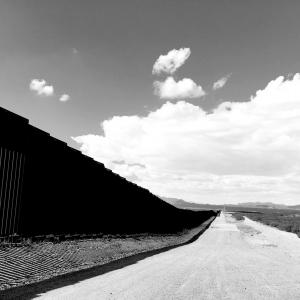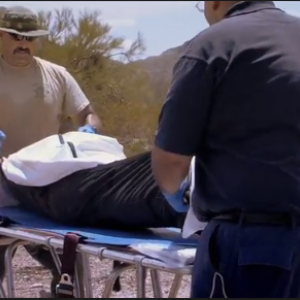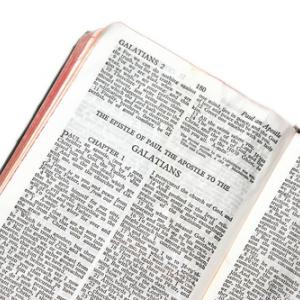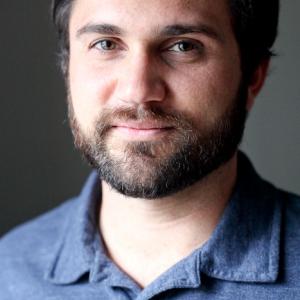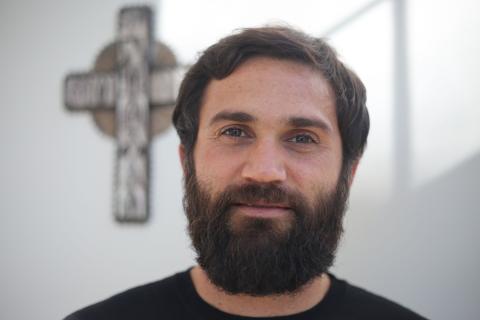
Isaac S. Villegas is pastor of Chapel Hill (N.C.) Mennonite Fellowship and president of the governing board of the North Carolina Council of Churches. He was born and raised in the U.S. borderlands as a child of Latin American parents.
Posts By This Author
Mutual Aid’s Radical Christian Roots
IN THE EARLY months of the pandemic, the “Care Bears” team of my local chapter of Southerners on New Ground (SONG), a Black, queer-led community of carceral abolitionists, reached out to members of the SONG family by phone. A small box arrived in the mail a few weeks later. The Care Bears had decided I’d benefit from a “a gift of love in a trying time”—tangerine tea, a candle, colored pencils, a notebook, and a tiny bottle of dandelion tincture made by the resident SONG herbalist.
I was drawn into the extended SONG family in 2017 when I joined the Black Mama’s Bail Out Action campaign. For Mother’s Day, SONG members paid the bail of mothers and caregivers held in the Durham, N.C. county jail because, like tens of thousands of people imprisoned in the U.S., they couldn’t afford their release. As a minister familiar with the jail’s protocols, I was called on to help obtain consent from the women being held. SONG raised the funds as part of a practice of mutual aid through paying off bail debt. “Money kept you in,” Pat Hussain, a co-founder of SONG said. “Black love got you out.”
My involvement with SONG has taught me the interconnections of Black feminism, prison abolitionism, and mutual aid—all as part of movements to create everyday institutions that nurture life. Abolitionism is about undoing the violence of incarceration, Angela Y. Davis writes in Abolition Democracy, “but it is also about building up, about creating new institutions.” And abolitionist Ruth Wilson Gilmore asserts that “abolition is about presence, not absence.”
Both Davis and Gilmore center the need for organized community to sustain life in a destructive world. They call for the creation of new institutions of mutual care while eroding the carceral system’s grip on society. With exceptional clarity, organizer and educator Mariame Kaba recently reissued this call: “Our work isn’t just a movement against cages and cops. It’s a movement for different ways of living together.” In this movement for a shared life where everyone can experience wholeness, “mutual aid exposes the failures of the current system and shows an alternative.”
Cross Marks on the Stable Door
ON SUFJAN STEVENS' 2012 Christmas album, Silver & Gold, he includes “Ah Holy Jesus,” a hymn about Christ’s crucifixion. Stevens sings: “For me, kind Jesus, was thine incarnation / thy mortal sorrow, and thy life’s oblation / thy death of anguish and thy bitter passion / for my salvation.” The cross on Golgotha casts a long shadow toward Bethlehem. When the child in the manger grows into adulthood, our world kills him. The story of the incarnation is the story of crucifixion.
For Stevens to sing such a hymn during this season reminds us that Jesus was born into an anguished world—an anguish that took hold in his life, an agony unto death. “The whole life of Jesus comes under the heading ‘suffered,’” theologian Karl Barth commented. “For the evangelists Luke and Matthew, the childhood of Jesus, his birth in the stable of Bethlehem, were already under the sign of suffering,” Barth continued. “The entire life of Jesus is lived ... in the shadow of the cross.”
Jesus didn’t offer salvation as an escape plan from our life’s travails but as a commitment to heal us from the habits of sin, the violence that cuts through each of us and the world. Christmas Day doesn’t redeem our wounded world in an instant—as if the old order vanishes with the newborn’s first cry. Instead, Jesus undergoes a human life and entrusts our lives to the Holy Spirit’s care.
Salvation is a salve, the soothing presence of the Spirit. This same Comforter took care of Mary at Jesus’ birth and ministered to him during his passion. “For me, kind Jesus, was thine incarnation ... and thy life’s oblation.”
God Waits Inside a Human Life
THE BIBLE IS about scrappy people. We read about communities that pass along wisdom, from one generation to the next, on how to survive (despite the violence that threatens their existence) and on faith in God, which keeps their hope alive. We worship the God of Exodus who leads people out of oppression. I believe in God’s ongoing work of liberation. However, the Exodus shouldn’t be the only lens through which we discern God’s action in our world. When the version of liberation found in Exodus becomes our central frame to recognize the characteristics of God’s presence, we occlude from our vision the Spirit’s prosaic and laborious provisions of survival.
In her landmark Sisters in the Wilderness: The Challenge of Womanist God-Talk, theologian Delores S. Williams turns our attention to the witness of Black women who create communities of survival. She writes about the “art of care” and the “art of connection” as survival strategies of Black women. Her guide is Hagar, a biblical character who struggles to piece together life in the wilderness after Abram and Sarai—with God’s sanction—banish her from their household. “We can speak of Hagar and many African American women as sisters in the wilderness struggling for life,” Williams explains, “and by the help of their God coming to terms with situations that have destructive potential.”
Our scriptures this month don’t imagine spectacular visions of liberation. Instead, they invite us to live out our hope within the wilderness—with Williams and Hagar—as we become people of refuge. We pass along God’s grace in our arts of survival and mutual care.
God Loves Without Reason
MOST OF THE friends I grew up with in church youth group don’t call themselves Christians anymore. They left church behind years ago. Yet here I am, still a very churchy Christian. Why have I stayed in the faith after all these years? Why do we keep doing this Christian thing?
We are tempted to convince ourselves that God will reward our faithfulness with blessings—either in this life or the next. This is a Christian logic as old as the Bible, a theology taken from the lips of Jesus himself: “Your Father who sees in secret will reward you” (Matthew 6:4). Prosperity theology isn’t an aberration but a perennial Christian impulse, an urge within all of us as we try to justify to ourselves our faith.
This way of thinking about beliefs, according to Meister Eckhart, turns God into a cow. “People look upon God with the eyes with which they look upon a cow,” he preached in the 14th century. “To love God the way they love a cow, because it gives you milk and cheese. This is how people behave who want to love God because of external wealth or inner comfort ... they love their self-interest.”
This month’s stories from Mark’s gospel invite us into the disciples’ struggle to understand why they’ve chosen to follow Jesus. Discipleship, we’ll discover, is a constant exposure to the selfish motives for our faith as we stumble into God’s truth—that, as Eckhart preached, “God loves us without a why.” God loves us without a reason, without making calculations. God loves us because God loves us.
Becoming Estranged From Empire
PASSAGES FROM THE book of Hebrews show up in the lectionary every Sunday this month. In Ernst Käsemann's landmark book The Wandering People of God, written in the context of 1930s Germany, this pastor and theologian characterizes the community described in the Epistle to the Hebrews as a people who wander in the wilderness of this world. “The basic posture of the bearer of [God’s] revelation should, in fact, be described as a wandering,” Käsemann writes; “the attitude of faith can only be described as wandering.” He locates the identity of the church in the biblical stories of Israel in the wilderness—the church as a people estranged from imperial power.
“I of course had in mind that radical Confessing Church which resisted the [Nazi] tyranny in Germany,” Käsemann wrote decades later, reflecting on his book as anti-fascist ecclesiology—a biblical theology for a German antifa church movement. When a society coheres around a nationalist identity that designates segments of the population as “other” and therefore a threat to patriotic unity, “the church must appear as a band of deserters.” To desert such nationalistic ideologies is to wander in search for Jesus because, according to Hebrews, he appears at the edge of society, outside the civic union, beyond the border—Jesus as the one who suffers “outside the city gate,” on the other side of the wall (Hebrews 13:12).
The last chapter of Hebrews invites the faithful to solidarity with Jesus, which involves a commitment to excluded people, to scapegoated populations: “Let us then go to him outside the camp and bear the abuse he endured” (Hebrews 13:13).
When Wisdom Throws a House Party
WE LONG FOR new beginnings, a restart, to go back in time to correct our mistakes or dodge the harm someone has done to us. But those former lives are inaccessible to us. All we have is this life now. Here we are in the middle: after the beginning and before the end. Usually we associate “middles” with “stuckness”—not the excitement of the new and not the relief of an end but locked in between. For example, the morass that prompts a midlife crisis, that languorous experience of the middle of life that leads to the purchase of a motorcycle.
In the church calendar, we’re in the season called “ordinary time,” a long stretch of weeks between Pentecost and Advent. These are the middle months where the scriptures plop us into the middle of stories. And that is where we find Jesus. The incarnation is an act of God in the middle of Israel’s story: not the beginning, not the conclusion, but God-with-us in the middle. This season of unceasing tedium has also been taken up into the life of God. Perhaps we could describe the incarnation as the midlife crisis of God?
Jesus is the one who has been with us from before the beginning, who has witnessed the groaning of all creation, the births and deaths and the life in between—and comes to us now, where we are, in our midlife, with our regrets and unfulfilled dreams, and guides us as we wander into the ordinary goodness of life.
Which Side Are You On?
GOD IS NOT a neutral observer of our worldly affairs. “God takes sides,” the Brazilian theologians Clodovis and Leonardo Boff explain in Introducing Liberation Theology. God is not a dispassionate consultant, nonpartisan mediator of divisions, or a disinterested negotiator of political antagonisms. “God takes sides and comes on the scene as one who favors the poor,” Mexican theologian Elsa Tamez writes in Bible of the Oppressed. “The God of the biblical tradition is not uninvolved or neutral,” U.S. theologian James H. Cone argues in A Black Theology of Liberation. “God is active in human history, taking sides with the oppressed.”
God has already decided to live in solidarity with people who have survived injustice after injustice. The incarnation reveals the partisanship of God—that, in Jesus, God becomes one of the “disinherited,” to use Howard Thurman’s language. The life of Jesus is the story of how God takes the side of “people who stand with their backs against the wall,” as Thurman puts it in Jesus and the Disinherited, populations “disinherited from participation in meaningful social process,” groups segregated from “any stake in the social order.”
The Bible passages this month call us to examine where we stand. They illumine the borders of power—the divide between privilege and oppression that slices through our communities—and prod us with a question: Which side are you on?
God Does Not Leave Us ‘Earthlings’ Behind
DURING THESE LONG months of pandemic, I’ve returned to the 14th century writings of Julian of Norwich, a theologian who lived through seasons of plague as a child. She lost neighbors and loved ones. Later, as an adult, she almost died from a mysterious illness. After her recovery, Julian received visions from God that she wrote down in a book of theological reflections.
God “made everything that is made for love,” Julian writes, “and the same love sustains everything, and shall do so forever.” On page after page of Revelations of Divine Love, Julian dwells on God’s steadfast care for all of creation. She offers—to herself and to her readers—words of comfort and hopeful reassurances (“All shall be well, and all shall be well, and all manner of things shall be well”), while staring clear-eyed at a life of suffering (“all the pains and sufferings of all creatures, both in body and spirit”).
When I can’t sleep, I repeat Julian’s line in my mind. “All shall be well, and all shall be well.” Her words have accompanied me through night after night of pandemic anxieties and despair. Her repetitions (“all shall be well, and all shall be well”) remind me of Psalm 130: “My soul waits for God more than those who watch for the morning, more than those who watch for the morning” (verse 6). We wait and watch for the glow of morning, for redemption’s dawn when all shall be well.
The Spirit's Nomadic Word
DO WE KNOW what we even mean when we say “God”? In the wake of the crucifixion, with our theological grammar shattered on Golgotha—where, in Jesus, God died—the events of Easter have us fumbling for new words.
To speak of our faith involves piecing together syllables into phrases that venture to say the unimaginable. The resurrection shocks us out of familiar patterns of thinking about God—an unsettling of our minds but also our lives. That is what we see on Pentecost: a bewilderment. People lose control of their tongues. The Spirit dispossesses the leaders of their power over communication. God reorders their movement with the invitation of the gospel. Pentecost morning concludes with an evening of food and fellowship, “the breaking of bread and prayers,” communion among strangers (Acts 2:42).
The Holy Spirit instigates a reformation of our communities as part of how we articulate the Word of God. “We need to find a new language,” writes Catholic theologian Rosemary Radford Ruether in Sexism and God-Talk, “that cannot be as easily co-opted by the systems of domination.” Habits of life accompany habits of speech. The events of Pentecost reveal a Spirit who refuses to honor our hierarchies of authority, of who represents God. From this primal episode in Acts, the church becomes a movement that transgresses the borders between insider and outsider, neighbor and foreigner, friend and stranger.
What Kind of Easter Is This?
“THEY WERE AFRAID.” Those are the last words of the earliest manuscripts of Mark’s gospel (16:8)—the oldest of the four gospels. Mark ends his story about Jesus with Mary Magdalene, Mary the mother of James, and Salome at the empty tomb. Terror seizes them. They flee in shocked silence. The end. What kind of Easter is this?
Scribes and theologians thought the same, so a couple centuries later they added different endings to Mark—easier endings, with Jesus coming back to offer further teachings. In Mark’s original Easter account, however, there is no resolution to the story. Instead, we read about three women at a tomb, bewildered. Here, resurrection doesn’t resolve anything. Instead, the event unsettles. The absence of a corpse provokes questions and invites a hope in the promise of unimaginable possibility. “Jesus is going ahead of you to Galilee,” a strange messenger in the empty tomb tells them, “there you will see him.”
Easter is an ending without a conclusion, a story without finality. The end returns us back to the beginning—to Galilee, where Jesus was born, where he was baptized, where he gathered disciples, where he healed the sick, fed the hungry, and preached good news. Resurrection means that nothing, not even death, will prevent Jesus’ invitation for us—who are weak and fearful, bewildered by a world we can’t control—to follow messengers who guide into the mysteries of Christ in the here and now.
Captive to Sin, Healed for Justice
“WE'RE CAPTURED by sin, we’re captive to a power,” said theologian Stanley Hauerwas, “not as something so much that I do as something that I’m captured by and that I don’t even recognize as captivity.”
In this month’s scriptures, we confront the captivity of sin—social forces that diminish life, powers of oppression that colonize our desires. Sin whispers lies about the world, deceptions that lead to harmful acts—harmful for our personal lives with neighbors and our collective lives as a society.
The gospel passages assigned for the first and last Sundays spotlight the sinful power of money—from the marketplace’s corruption of the temple courts to Judas Iscariot’s betrayal of Jesus in exchange for silver. Money bookends Lent. We cannot talk about Jesus without talking about how mammon worms itself into our longings—the allure of wealth, the power of profits.
Jesus enacts liberation from the sinfulness of the thrall of money. In John 2, Jesus frees people from money’s bondage by scattering gold and silver in the streets. He seizes the currency of the bankers. He redistributes the wealth of the few into the pockets of the many. The reign of God will involve an economic overhaul. Lent would be a fitting season to tax the rich and to cancel student and medical debt.
The Rabbit Who Visits My Garden: The Trinitarian Life of God
THE CHRISTIAN LIFE returns again and again to prayer. We pray by ourselves, and we pray with others. Worship draws us to the scriptures, with the psalter at the center of the Bible, which bears witness to the back-and-forth, the disagreement and commitment, the frustration and intimacy, of God’s communication with God’s people—a textual record of conversations across the ages.
With the guidance of these holy words, prayer transfigures us with divine communion, our lives caught up in the life of God. We find ourselves with the disciples when Jesus takes them up the mountain, where “he was transfigured before them” (Mark 9:2). We are Jesus’ companions. He welcomes us into a life of prayer, which is our union with God.
In After the Spirit, theologian Eugene Rogers uses the traditional language of church doctrine to describe this process of deification. “The Holy Spirit incorporates human prayer into the prayer of the Son to the Father.” In the biblical scene, we are standing there with Jesus on the mountain as the thick presence of heaven descends on him like a cloud (Mark 9:7). “Prayer is a transfiguration of human beings,” Rogers explains. This story is about our participation in the trinitarian life of God.
The Bible passages this month lead us from Epiphany to Lent, with Transfiguration Sunday as our transition from one season to the next. During Lent we open ourselves to how the light of Epiphany’s revelations about God exposes sin’s insidious powers in our lives and in the world.
Incarnation Means Solidarity
THESE SCRIPTURES move with us from Christmas to Epiphany, drawing us into the mysteries of the divine life in the world. The incarnation is a call to notice where the Spirit surprises us with God’s presence. Dominican theologian Herbert McCabe guides our vision: “Christ is, indeed, to be found in the present but precisely as what is rejected by the present world,” he writes. Christ “is to be found in those who unmask the present world, those in whom the meaninglessness and inhumanity and contradictions of our society are exposed.” God’s mysteries are revealed among the rejected and despised, the people who expose society’s promises as the hypocrisies of political brokers who ensure the prosperity of the millionaires and billionaires—and, soon, the world’s first trillionaire.
To believe these scriptures about God’s presence is to realign our solidarities, to become conspirators with the One whose justice is liberation from the economic, political, and social patterns that are destroying life. These structures that organize our world for the benefit of the powerful are in the midst of collapse. They are “passing away,” as Paul claims. We’re always living through human self-destruction, with the United States as an instance of history’s cycles of cataclysm. If we want to go on in hope, then we must love those God has created, and give ourselves to the despised and rejected, to our neighbors caged in prisons and segregated from us by the border. There, God will astonish us with epiphanies: life’s survival on the underside of history.
When Death in the Desert is Not an Accident
IN DOUGLAS, ARIZ., in the shadow of the U.S.-Mexico border wall, a cemetery stretches across the desert. Between the orderly rows of gravestones, I notice clusters of cement blocks lodged in the sand with the same word etched into their flat surfaces: Unidentified. “Unidentified Female,” “Unidentified Male,” carved into the center of the tablet, along with a date: “Found Aug. 9, 2004.” “Found Dec. 31, 2005.” “Found Jan. 18, 2009.” “Found Feb. 12, 2009.”
A Mennonite activist whispers over my shoulder, explaining that the date marks when the remains were found in the borderland wilderness—a corpse in decomposition, a skeleton bleached in the sun, perhaps only a skull or a set of teeth.
Dark Advent
In the beginning was the end
and in the end, silence
and the silence is God.
Jesus Resurrected and 'The Undocumented'
At the Full Frame Film Festival in Durham last week, I saw Marco Williams’ new documentary, The Undocumented, which tracks migrants as they hike into the United States across the border between Mexico and Arizona, trying to escape the detection of border patrol agents, and trying to survive the deadly heat of the Sonoran desert.
The documentary follows a young man, Marcos Hernandez, as he tries to find his father, Francisco, who was last seen in the desert walking for days in the 120-degree summer heat. Francisco left their home in Mexico with a coyote — man he paid $2,000 to lead him across the border — to make enough money to pay for his son’s expensive dialysis treatments. But he never called; he never returned. The coyote reported that he left Francisco in the desert because he was sick and couldn’t keep up with the other migrants in the group. Marcos fears the worst — that his father died of dehydration, of heat exhaustion. But to confirm the death he has to find the body.
The filmmaker focuses on the morgue in Tucson, Ariz., where the medical examiner investigates human remains, looking for clues that would help identify the dead in order to return whatever is left to family members and friends, to provide some kind of closure, to honor the dead with a burial.
In the film, Marcos won’t believe his dad is dead until he can see his dead body, or whatever is left of his body — a skull, teeth, his rib cage. He will not believe unless he can see.
“Unless I see the mark of the nails in his hands, and put my finger in the mark of the nails and my hand in his side, I will not believe” (John 20:25). That’s what Thomas says to the other disciples about the resurrected Jesus; and what Thomas says about needing to see the body reminds me of the story of Marcos, about the need to see in order to believe.
Paul’s Politics
The apostle Paul calls the church in Corinth a body — and that’s political language: “God has arranged the parts in the body, every one of them, just as he wanted them to be … As it is, there are many parts, but one body” (1 Cor. 12:18-20).
As Dale Martin argues in his book The Corinthian Body, Paul gets his language about the social body, the political body, from other Greco-Roman speeches and letters. He uses a style of writing and speaking called a “concord” — homonoia in Greek. Politicians would give speeches or write letters trying to convince the diverse people of the city to unite in a common project, to share the same goals for society, to share a common politics. In these “concord” addresses, politicians would call the society a body, just like Paul does in his letter to the divided church in Corinth. We are one body, politicians would say, so we need to act accordingly. We are one — united, bound together. Of course, politicians only made these speeches when they needed to: that is, when dissatisfied segments of society wanted to revolt (see Martin, Corinthian Body, 38-47).
Drones: Forces of Evil in Heavenly Places
People of Jesus work against demons — against the forces of evil that eat away at the goodness of God, the wonder of creation, the life of God in the world. Demonic forces roam the world, corrupting minds and bodies, cultures and governments, trying to bring ruin upon all that is good and beautiful. They dehumanize, devastate, and destroy life.
Weaponized drones are demons: evil spirits of the air, specters in the heavens, shadowy presences. They are forces of evil in heavenly places, triggering mental anxiety and bodily harm, instigating psychological damage and death, raining down terror and trauma.
Stability vs. Mobility
Jonathan Wilson-Hartgrove and Isaac S. Villegas are friends and fellow kingdom-bringers in Durham, North Carolina. Since publishing The Wisdom of Stability in 2010, Jonathan has been calling Christians to put down roots and pay attention to place for the sake of God’s reign. Isaac has gently challenged him to recognize the dangers of stability and the way immigrants or marginalized members of a community are often excluded by those who “own their place.” They offer their conversation as an invitation to discern with them a theology of place for our time.
Isaac S. Villegas: I was working alongside a little girl in our congregation’s community garden at the women’s shelter in Chapel Hill. As we were digging, she looked up at me and said that her mom warned her to beware of lice when playing outside. I reassured her that I hadn’t seen any lice around, but I asked her if she knew what to look out for. “Yes,” she said. “My mom told me to watch out for Mexicans because they bring lice.” I looked down at my hands, wondering if my hue revealed that I’m from lands further south than Mexico. Will this child grow up to think that people like me don’t belong in the South, that we are social contaminants, that our cultures dirty the body politic, that we spread lice?
These are the questions that linger in my mind when I hear my friend Jonathan argue for a recovery of “the wisdom of stability” in the Christian community. In this land where both Jonathan and I live, I’m uneasy when I hear “stability” because I see how such rhetoric belongs to a particular Southern tradition. I am the foreigner, of questionable lineage, that the people who’ve been here longer can reject or accept—reject because they think that I’m a threat to the stability of the community, or accept because they think I will contribute to a sustainable future. In either case, the assumption is that they are the ones entrusted with the land and culture. Arguments about stability have fueled people’s claims to own or steward the land and their assumption that they are the gatekeepers of society, deciding who belongs where.
“I hope to reprogram your default setting,” Jonathan writes in his book. “Our default is to move.” Instead of movement, he points to the witness of trees, which serves as the book’s focal image: “Trees can be transplanted ... But their default is to stay.” I worry that to celebrate stability as the solution to movement renders recent immigrants as defective Christians—wild, unruly, in need of reprogramming.
Movement is my default setting: It’s in my immigrant blood; it’s the story of my family. While the wisdom of stability privileges the parts of the Bible that call us to permanency, I find good news in the biblical stories of wandering, exodus, relocation, and mission. These stories resonate with the lives of migrants—people who are not trees, but birds: always building and abandoning nests as they follow the seasons.
Jonathan Wilson-Hartgrove: Every writer needs friends who remind them that words can be dangerous. I’m grateful for Isaac, who keeps me thinking hard about what I’m saying and why.
Shortly after The Wisdom of Stability was published, I got a call from the director of a mission agency who’d read the book. He asked if I’d come and speak to the global gathering of the group’s staff. I’d love to, I told him, but wondered why they thought a word on stability was needed. “Well, we have a problem in missions,” he said. “We keep sending people who’ve never belonged anywhere. They don’t seem to have much capacity to connect with the places where we send them.”
Called to Welcome the Stranger
Many people in our country say that their Christian faith is a significant force in their lives. I am one of those people. As I listen to my sisters and brothers in the church discuss immigration legislation, I wonder why our faith hasn’t lead us into a way of life that defuses this contentious debate.
If, as Christians claims, the story of the Bible is important to us, then we shouldn’t be so worried about foreigners; we shouldn’t be so afraid of immigrants.

